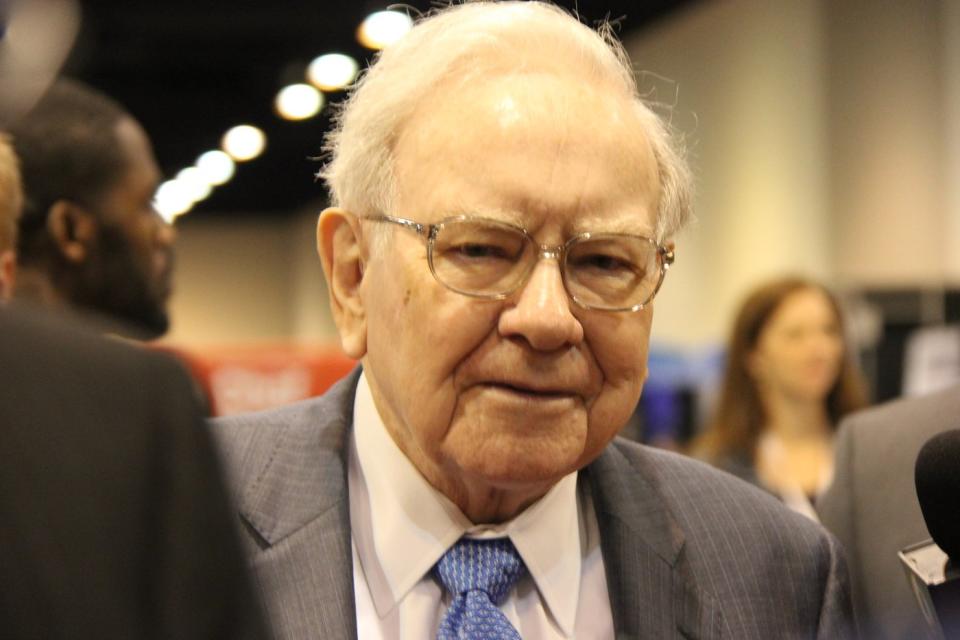Among Wall Street billionaires’ money managers, the affectionately named “Oracle of Omaha” is in a class of its own.
Since he became CEO of Berkshire Hathaway (NYSE: BRK.A)(NYSE: BRK.B) in 1965, Warren Buffett has overseen a total return on his company’s Class A shares (BRK.A) of more than 4,940,000%, as of the closing bell on June 13. For comparison: the benchmark S&P500 is approaching a total return, including dividends paid, of 36,000% since Buffett took the reins. When you outperform the most followed index by that much, you attract attention.
No Form 13F filing is more expected each quarter than Berkshire Hathaway’s. A 13F provides a detailed look at what Wall Street’s brightest investment minds have bought, sold and held, and is a required filing for institutions and money managers with at least $100 million in assets under management. In the quarter ended in March, Berkshire owned 44 stocks and two exchange-traded funds.

While this may sound like a well-diversified portfolio, it couldn’t be further from the truth. Buffett and his top investment advisors, Todd Combs and Ted Weschler, oversee a highly concentrated portfolio. Berkshire’s investment gurus strongly believe in putting a lot of capital behind their top ideas – and it definitely shows.
As of the closing bell on June 13, 63% ($243.4 billion) of the $388 billion portfolio Warren Buffett oversees at Berkshire Hathaway was invested in three stellar stocks.
Apple: $169,114,296,728 (43.5% of invested capital)
As has been the case for some time, tech stocks Apple (NASDAQ: AAPL) accounts for an outlandish percentage of the invested assets Warren Buffett oversees at Berkshire. Even after selling nearly 116.2 million shares of Apple in the first quarter for tax purposes, the stock’s recent rally has increased its weighting in Berkshire’s investment portfolio to nearly 44%.
There appear to be three main reasons why Buffett favors Apple, calling it “a better company than any company we own.”
The first catalyst has everything to do with consumer behavior. Buffett has openly admitted that he doesn’t understand anything about how an iPhone works, but he does have a good understanding of consumer behavior.
Apple has an exceptionally loyal following that is seemingly always eager to buy its products. Since introducing a 5G-compatible version of its iPhone in the fourth quarter of 2020, the company has maintained a 50% or more share of the domestic smartphone market.
Second, Buffett and his team likely appreciate the innovation and leadership that CEO Tim Cook has brought to the table. Beyond just the evolution of Apple’s physical products (the iPhone, Mac, iPad and Apple Watch), Cook is spearheading a multi-year transition as the company moves to higher-margin subscription services.
Last week at Apple’s annual developer conference, the company unveiled an assortment of new artificial intelligence (AI) features that could help it get a piece of the billion-dollar AI pie. These new features can help innovate the functionality of Apple’s major product lines.
Apple’s third selling point for Warren Buffett is its world-leading capital return program. In addition to returning $15 billion to shareholders through annualized dividends, the company has also repurchased $674 billion in common stock since the beginning of 2013. By simply sitting on his proverbial hands, Buffett has seen Berkshire’s stake in Apple grow over time thanks to these aggressive buybacks.


Bank of America: $40,549,769,756 (10.4% of invested assets)
The second beautiful stock that makes up a significant percentage of Berkshire Hathaway’s $388 billion investment portfolio is nothing but a money center giant. bank of America (NYSE: BAC). The more than 1 billion shares of BofA owned by Buffett’s company amount to a market value of more than $40 billion.
There is no sector of the market that Warren Buffett loves more than the financial sector, and there is a very simple reason for that. I like to call it the “numbers game.”
Buffett and his team are well aware that economic downturns and recessions are a normal part of the long-term economic cycle. But instead of foolishly (lowercase ‘f’) trying to predict when these recessions will occur, Buffett, Combs and Weschler have loaded Berkshire’s portfolio with cyclical companies that can benefit from long-winded expansions (i.e. the numbers game). Long periods of economic growth allow bank stocks to grow their loan portfolio and reap the benefits of interest income.
Speaking of interest income, no money center bank is more sensitive to changes in interest rates than Bank of America. As the Federal Reserve implements its most aggressive rate hike cycle since the early 1980s, it is BofA that has seen its net interest income rise more than any other money center bank. As long as core inflation remains stubbornly high (looking at you, shelter costs!), Bank of America should benefit from the Fed’s current wait-and-see approach.
A lesser-known catalyst that is causing a stir for BofA is its investments in digitalization. At the end of March, digital banking adoption among households rose to 76%, an increase of 6 percentage points compared to the comparable period in 2021. Meanwhile, 50% of consumer loans were processed online or via a mobile app. Digital banking transactions are significantly cheaper for Bank of America than in-person or telephone interactions and should increase operational efficiency.
Bank of America also offers a robust capital return program when the U.S. economy is healthy. Berkshire receives nearly $1 billion in dividend income annually from its stake in BofA.
American Express: $33,686,381,433 (8.7% of invested capital)
The third great stock that, together with Apple and Bank of America, accounts for 63% of the $388 billion investment portfolio that Warren Buffett is putting to work at Berkshire Hathaway, is the credit services goliath. American Express (NYSE:AXP). AmEx has been a continuous holding of Buffett’s company since 1991.
The bull thesis for AmEx, like BofA, revolves around the fact that the business is cyclical. Of the twelve U.S. recessions since the end of World War II, nine have resolved in less than a year, and none of the remaining three have exceeded eighteen months.
By comparison, the majority of expansions have persisted for several years, with two growth periods reaching the ten-year mark. Companies that rely on consumer and business spending growth, like AmEx, benefit greatly from this disparity between recessions and expansions (the “numbers game” in action).
One of the main reasons American Express has been such a phenomenal investment for decades is its willingness to participate on both sides of a transaction. It is currently the third largest payment processor by credit card network purchase volume in the US (the largest consumer market worldwide). This allows the company to generate predictable trading fees in any economic environment.
But American Express is also a lender. It has the ability to generate annual fees and interest income from its cardholders. While this exposes the company to the possibility of credit defaults and losses during recessions, these downturns are, as noted, short-lived.
To further reinforce this point, American Express has historically done a fantastic job attracting higher-income cardholders. Affluent cardholders are less likely than the average American to change their purchasing behavior or default on their bills during periods of economic uncertainty.
Last but not least, American Express has become quite an income staple for Warren Buffett. Based on Berkshire Hathaway’s cost basis of $8.49 per share for AmEx, the $2.80 the company pays out in annual dividends per share equates to a 33% return on costs!
Should You Invest $1,000 in Apple Right Now?
Before you buy shares in Apple, consider this:
The Motley Fool stock advisor The analyst team has just identified what they think is the 10 best stocks for investors to buy now… and Apple wasn’t one of them. The ten stocks that survived the cut could deliver monster returns in the coming years.
Think about when Nvidia created this list on April 15, 2005… if you had $1,000 invested at the time of our recommendation, you would have $808,105!*
Stock Advisor provides investors with an easy-to-follow blueprint for success, including portfolio building guidance, regular analyst updates and two new stock picks per month. The Stock Advisor is on duty more than quadrupled the return of the S&P 500 since 2002*.
View the 10 stocks »
*Stock Advisor returns June 10, 2024
Bank of America and American Express are advertising partners of The Ascent, a Motley Fool company. Sean Williams has positions at Bank of America. The Motley Fool holds positions in and recommends Apple, Bank of America and Berkshire Hathaway. The Motley Fool has a disclosure policy.
63% of Warren Buffett’s $388 Billion Portfolio Is Invested in These Three Beautiful Stocks Originally published by The Motley Fool







